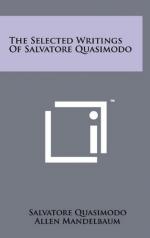|
This section contains 1,836 words (approx. 7 pages at 300 words per page) |

|
Salvatore Quasimodo has always worked to remove the barriers that prevent understanding between men. This preoccupation brought about a change in his poetic and critical orientations during the war. The time for engaging in "abstract modulations of one's own feelings," he insists, has come to an end. He believes that poetry must serve as a means of communication; the poet must address all men and speak out for truth and "not renounce his presence" in the world. But it would be a mistake to use his own words against him, to interpret them as a repudiation of his earlier poetry, and so to pass over the very personal and often involute poems in which he distilled his private anguish. (pp. 3-4)
While a number of the earlier poems may have seemed derivative, with echos of D'Annunzio and Pascoli and certain attitudes of despair reminiscent of Ungaretti or Montale...
|
This section contains 1,836 words (approx. 7 pages at 300 words per page) |

|


